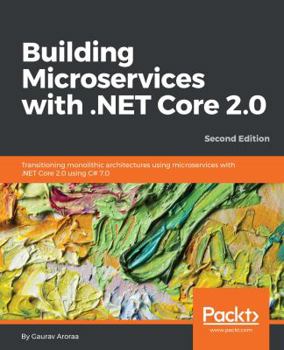Building Microservices with .NET Core 2.0: Transitioning monolithic architectures using microservices with .NET Core 2.0 using C# 7.0
Select Format
Select Condition 
Book Overview
Architect your .NET applications by breaking them into really small pieces - microservices -using this practical, example-based guide.
Key Features
Start your microservices journey and get a broader perspective on microservices development using C# 7.0 with .NET Core 2.0 Build, deploy, and test microservices using ASP.Net Core, ASP.NET Core API, and Microsoft Azure Cloud Get the basics of reactive microservicesBook Description
The microservices architectural style promotes the development of complex applications as a suite of small services based on business capabilities. This book will help you identify the appropriate service boundaries within your business. We'll start by looking at what microservices are and their main characteristics.
Moving forward, you will be introduced to real-life application scenarios; after assessing the current issues, we will begin the journey of transforming this application by splitting it into a suite of microservices using C# 7.0 with .NET Core 2.0. You will identify service boundaries, split the application into multiple microservices, and define service contracts. You will find out how to configure, deploy, and monitor microservices, and configure scaling to allow the application to quickly adapt to increased demand in the future.
With an introduction to reactive microservices, you'll strategically gain further value to keep your code base simple, focusing on what is more important rather than on messy asynchronous calls.
What you will learn
Get acquainted with Microsoft Azure Service Fabric Compare microservices with monolithic applications and SOA Learn Docker and Azure API management Define a service interface and implement APIs using ASP.NET Core 2.0 Integrate services using a synchronous approach via RESTful APIs with ASP.NET Core 2.0 Implement microservices security using Azure Active Directory, OpenID Connect, and OAuth 2.0 Understand the operation and scaling of microservices in .NET Core 2.0 Understand the key features of reactive microservices and implement them using reactive extensions




